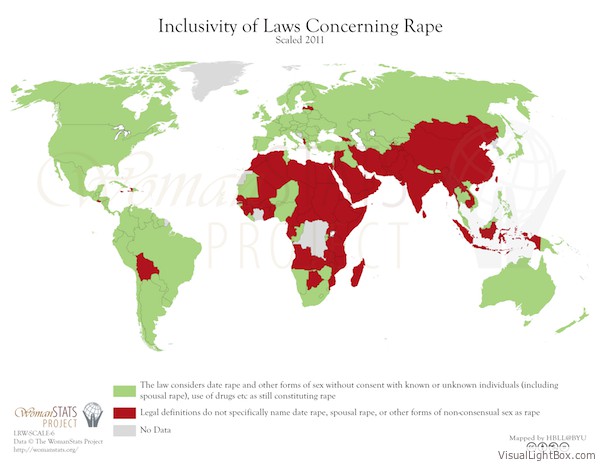I remember the first time I was introduced to marital rape. I was in my early teenage years, and I was watching Gone with the Wind for the first time. I wasn’t particularly interested in or impressed by the film, but one scene stuck with me. You know, that scene. The one where Rhett rapes Scarlett.
The scene bothered me; I didn’t understand why a husband would hurt his wife. And I didn’t understand why Scarlett was so happy the next morning. Her reaction and the overall nonchalant attitude toward the situation confused me. Everything else in the film (which continues to be considered one of the greatest American films ever made) glorifies the scene as a grand, romantic, and passionate gesture.
During the 1860s, when the film takes place, and even during the 1930s, when the book was written, marital rape was perfectly legal in the United States. Indeed, it was perfectly legal in in all but a few countries around the world.
Unfortunately, not much has changed.
According to UN Women’s 2011 Progress of the World’s Women: In Pursuit of Justice report, out of 179 countries with available data, 52 had laws against marital rape, while 127 countries did not have laws against marital rape.
As this map indicates, the international community appears split on whether it legally recognizes certain forms of rape, including marital rape. In practice, however, marital rape is a global problem that affects women in every country.
In Sweden, “9.2 percent of women who participated in the WHO’s Violence Against Women instrument (VAWI) study suffered sexual violence by an intimate partner.”
In Belarus, “a 2008 study of women conducted by the Belarus State University found that 13.1 percent of respondents reported that they had experienced sexual violence from their intimate partner”
In Turkey, “a Human Rights Watch report issued…documents brutal and long-lasting violence against women and girls in Turkey by husbands, partners, and family members, and the survivors’ struggle to get protection. A study by Turkey’s Hacettepe University has shown that about 42 percent of Turkish women experience physical or sexual violence inflicted by a relative at some point in their lives.”
In Australia, “12 percent of women reported experiencing sexual violence by an intimate partner (current or former) over their lifetimes, including instances of attempted (3 percent) and completed (6 percent) forced intercourse (i.e. rape).”
In Colombia, it was found “that the figures relating specifically to rape by the husband or partner show a fall of 2 percentage points between 2005 and 2010, the rate for this type of abuse having declined from 11.5 to 9.7 per cent. The percentage relating to spousal rape nevertheless remains very high”
In Zambia, “among ever-married women, [a] current husband/partner is reportedly the most common perpetrator of sexual violence (37 percent).”
In China, a “domestic survey revealed that about one-fifth of male respondents said they had forced their partners to have sex…The study in China also showed that women are more at risk of rape from a partner than a non-partner. Among women who had been raped, three in five had been raped by a partner.”
In Nepal, “14 percent [of ever-married women] have been physically forced to have sexual intercourse by their husbands even when they did not want to.”
In Canada, 20 percent “of women were sexually assaulted by their spouses.”
In Kyrgyzstan, “Most women…are afraid or ashamed to speak about sexual crimes. In a country with patriarchal norms and a dysfunctional justice system, few men are charged, especially husbands, on sexual assault charges, even though government statistics indicate 92 percent of rapes are committed by sexual partners or former partners.”
In a number of countries, marriage is seen a legal or practical solution to rape. If a rapist marries his victim, he can lawfully escape criminal punishment in Algeria and Tunisia, Mozambique, and Jordan (Morocco also had such a law until it was amended in 2014). In many other countries, victims are forced to marry their rapists by their family members in order to preserve the family’s honor.
This idea of honor stems from and into other notions of masculinity, femininity, ownership, entitlement, subordination, and dominance. All around the world, women are still considered to be their husband’s property.
With the prevalence of marital rape as high as it is, it will take a lot to abolish it completely. We need to enforce marital rape laws, and put laws in place where they don’t currently exist. We need to fight against cultural norms that stem from traditions and media influences. We need to educate girls and boys, tell them that what Rhett did in Gone with the Wind was wrong, and teach them that love means respect and consent.
—by SJ

